By Rafi-uddin Shikoh, DinarStandard
For all those who have wondered when and how the $1 trillion+ Islamic Finance industry and the estimated $640 billion+ world-wide ‘Halal’ food industry will ever connect—we hopefully now have a tool that will kick this off.

ThomsonReuters, in partnership with IdealRatings, have recently launched the SAMI Halal Food Index (Socially Acceptable Market Investments) which is a collection of food industry companies listed on OIC (Organization of Islamic Conference) member country public markets and screened for Halal compliance. This Index has turned part of the Halal food market into an asset-class and made them approachable to the usually risk-averse Islamic Finance industry.
As large and real the Halal food industry is, it’s ironic very little Islamic Finance investment or transactions have taken place in the sector. Conversely, the Halal food industry, which by definition is adhering to Islamic principles, has for the most part ignored Islamic compliance of their financing. Furthermore, they are forgoing an available and compliant capital source that Islamic Finance can provide.
This first of its kind Halal Food Index was unveiled at the opening of the World Halal Forum on April 4th, 2011 by Tun Abdullah Ahmad Badawi, former Malaysian prime minister. The visionary behind the Index, Mr. Rushdi Siddiqui, Global Head of Islamic Finance and OIC at ThomsonReuters, calls this the re-uniting of twins separated at birth.
Here are some basic facts about the SAMI index and comments from Mr. Siddiqui on its relevance to individual investors, Islamic Finance industry, and the Halal food industry.
Summary Profile
The Socially Acceptable Market Investments (Sami) Halal Food Index is about companies involved in food processing, distribution, fishing, farming, etc. The companies in the index, at stage one, are from 15 OIC member countries, about 270 plus companies with market capitalization of $114 billion.
 Source: SAMI Index (Chart by DinarStandard)
Source: SAMI Index (Chart by DinarStandard)
SAMI Index key criteria:
- Nation: Member of OIC countries
- Business Activity: Restaurants, Beverages – Non-alcoholic, Fishing, Farming, Food Processing, Food Distribution
- Non-permissible Revenue: Has no revenue from pork, alcohol, tobacco and impermissible foods
- Investment Guidelines: Set of Minimum Market Cap, Minimum Free Float Market Cap and Trading Volume restrictions
- Shariah Compliance: Equities have to be compliant according to respective Shariah mandate
- (Click here to download PDF document with detailed methodology)
- (See list of top performing SAMI Index Companies)
What is the relevance of this Index to retail investors?
Muslims, as consumers, already invest in these companies by buying their Halal products. Now they can be investors of such companies by purchasing shares in these companies directly or through funds. To those (Muslims) who have been saying investing in the stock market is gambling–investing in publicly listed Halal food companies in Muslim countries becomes a true investment vehicle for its own local/regional economies.
Shariah compliance is not enough for many retail Muslim investors, there has to be more connectivity to companies if Islamic investing is going to make commercial bank depositors into capital market investors. For example, there are only 560 plus Islamic funds and total AUMs of $37B, and we speak about 1.6 billion Muslims, do the math!
Islamic equity investors in the west have difficulties understanding why and how Microsoft, IBM, Apple, Pfizer, etc., are Shariah compliant, but they invest because (1) approved by a Shariah scholar AND (2) there is, at minimum, market performance. The dilemma of understanding becomes more pronounced in Muslim countries where investors typically invest locally or regionally, as they know these companies, use their products, etc.
What does this index mean for Islamic finance?
The industry has been talking about authenticity, innovation, Sharia based funds etc, and the Sami Halal Food index may just be the model for these. It is about Muslim money staying in Muslim countries for growing and building companies that contribute to the real economy.
For Islamic finance, the Halal industry has generally been viewed as the (1) ‘kebabs for lunch’ and (2) as a business model deemed too risky for Islamic corporate loans. But, when Halal presented also as an asset class and about inward investments or even investment banking, it becomes an interesting conversation.
One of the attractiveness of this Index is that it’s much easier to explain to the users/consumers of Halal products. In the west, typically consumers of products become investors of those companies. It may even go as far as HNWs buying these companies because the products are superior.
Thus, we can now take this Sami Halal food index, 200 plus companies from the Muslim countries, and create a fund based on it for investors. These potential investors are also consumers of these companies’ products in their respective countries. For example, if I’m a fund sales-person tasked to gather investor’s money into the fund, the sales script is much easier than other Shariah compliant funds. The consumer will realize the credibility of the offering, because they are familiar with the company products.
Relevance to Halal Food Industry Players
The Halal food industry has not done itself well in explaining its proposition to either Islamic finance or media journalists in Islamic finance. For example, there is a well known journalist covering Islamic finance for about 20 years, and his coverage on the Sami Halal food Index was that Islamic finance may not move from its comfort zone of real estate understandings to give compliant loans to Halal food manufacturers. Yes, agreed. But, here we are talking about two areas where Sukuk can be utilized by Halal food companies:
1. To build factories where Halal food is ‘made,’ a true asset backed financing, an Ijara Sukuk makes sense, all things being equal to conventional loans/bonds and level regulatory/tax field. Thus, a Sukuk financed Halal food factory, is an end to end Shariah based solution!
2. Many of the Halal companies have been built/ financed by conventional debt, hence; fail the debt/asset or debt/market cap financial ratios of Shariah compliant screening. This presents an interesting opportunity to issue a Sukuk and refinance conventional debt with Islamic paper, hence, increase supply of corporate Sukuk and number of companies in the Halal food space that pass the Shariah complaint financial screens. Malaysia has shown this can be done, and has done it. For example, during my days at my previous employer, an index provider, PLUS, the major toll operator, was failing the debt screen, issued a Sukuk (aligned to AAOIFI standards) and sued proceeds to refinance conventional and BBA debt, hence, becoming a Shariah complaint company in the Islamic index for the country.
What is the role of IdealRatings and World Halal Forum?
IdealRatings has been screening companies for Sharia adherence for a number of years. They do research-based screening over the commonly used automated screening. World Halal Forum, along with International Halal Integrity Alliance, has full understanding of the Halal food process.
 Tun Abdullah Ahmad Badawi, former Malaysian prime minister, congratulating Mr. Rushdi Siddiqui on the launch of the SAMI Index at the World Halal Forum held April 4-5, 2011, in Malaysia
Tun Abdullah Ahmad Badawi, former Malaysian prime minister, congratulating Mr. Rushdi Siddiqui on the launch of the SAMI Index at the World Halal Forum held April 4-5, 2011, in Malaysia
What are the challenges faced by food companies in the index?
The major challenges include: (1) excessive weighting of Malaysia’s Sime Derby, we had to put a ceiling on its weighting to 20 per cent; (2) free float is small for many companies and (3) illiquidity for many companies. These are common issues when investing in emerging and frontier markets. However, the more important point is that these companies, including the small capitalized companies, are now in the world’s first Halal Food Index, and are on the radar screens of investors.
What are the expectations of the Index?
We expect investment products like mutual and exchange-traded funds will be launched off of the Index, giving consumers another viable avenue to invest. A Halal food fund may be easier to explain to the Muslim ‘woman and man on the street’ than Sharia compliant companies like Exxon Mobile, Pfizer or Procter & Gamble. As the index gathers traction over time in the marketplace, it will become a high-profile index, hence, an ideal marketing opportunity for investor relations department for companies in the index. It may even encourage privately held Halal food companies to go public to be included in the index.
SAMI Halal Food Participation Index (March ‘10 – March ‘11)
TOP PERFORMERS
| FOOD PROCESSING | ||
| Name | Country | Price Change 52 weeks |
| Dhofar Poultry Company SAOG | Oman | 333.21% |
| PT Charoen Pokphand Indonesia Tbk | Indonesia | 259.55% |
| Nestle Pakistan Ltd. | Pakistan | 179.58% |
| PT Mayora Indah Tbk | Indonesia | 141.25% |
| Unimer Groupe | Morocco | 112.64% |
| FOOD DISTRIBUTION | ||
| Name | Country | Price Change 52 weeks |
| Abdullah Al Othaim Markets Co | Saudi Arabia | 56.39% |
| Al Meera Consumer Goods Company | Qatar | 13.94% |
| Label’Vie SA | Morocco | 5.45% |
| CNI Holdings Berhad | Malaysia | -30% |
| Countryal Agriculture Marketing Company | Saudi Arabia | -56.61% |
| FARMING/FISHING | ||
| Name | Country | Price Change 52 weeks |
| PT FKS Multi Agro Tbk | Indonesia | 214.81% |
| QL Resources Berhad | Malaysia | 76.16% |
| Ismailia Misr Poultry | Egypt | 61.83% |
| Kretam Holdings Berhad | Malaysia | 59.84% |
| PT BW Plantation Tbk | Indonesia | 47.22% |
| BEVERAGES | ||
| Name | Country | Price Change 52 weeks |
| PT Akasha Wira InterCountryal Tbk | Indonesia | 98.31% |
| Coca-Cola Icecek A.S. | Turkey | 33.87% |
| Ersu Meyve ve Gida Sanayi AS | Turkey | 31.58% |
| Kristal Kola ve Mesrubat Sanayi Tic. AS | Turkey | 25.26% |
| Dhofar Beverages and Food Stuff | Oman | 1.89% |
| RESTAURANTS | ||
| Name | Country | Price Change 52 weeks |
| KFC Holdings (Malaysia) Bhd. | Malaysia | 89.02% |
| QSR Brands Berhad | Malaysia | 57.10% |
| Herfy Food Services Co | Saudi Arabia | 34.47% |
| Kout Food Group KSCC | Kuwait | 24.29% |
| Al-Tajamouat for Catering & Housing Co. | Jordan | 7.81% |
(Disclaimer Note: DinarStandard is on the Advisory Board of the SAMI Halal Food Index)

 Source: SAMI Index (Chart by DinarStandard)
Source: SAMI Index (Chart by DinarStandard)


